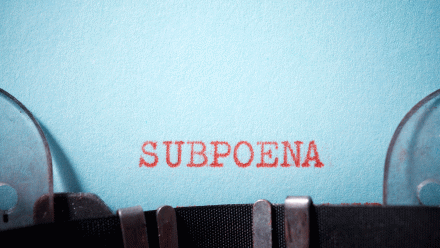Q: Our church received a subpoena requesting the donation records of someone in our congregation. The person is in a court case involving child support, and his ex-wife’s lawyer wants to see how much money he has been giving to the church to prove he’s making more than he says. Do we have to comply?
Are Church Records Privileged?
Church records are not inherently “privileged.” The term “privilege” or “privileged” refers to evidence that is not admissible in court because of some fundamental public policy. Records that are not privileged generally are subject to the subpoena power like any other organization. No state or federal law confers special “privileged” status on all church records.
There may be a very limited exception for notes created by a pastor that summarize the content of counseling sessions with parishioners if the sessions qualify for the clergy-penitent privilege under state law. In general, this means that the counseling consisted of confidential, spiritual counsel with the minister. But aside from this, neither the courts nor state or federal legislatures have recognized any generalized privilege for church records.
What About Subpoenas Issued by Other States?
A subpoena issued by a state court ordinarily is unenforceable outside the state, or in some cases the county, where it was issued. However, it is possible in some cases for a subpoena issued by a court in one state to be “processed” in another state. This requires additional work, and so many attorneys seek to avoid this step by attempting to have a church voluntarily respond to a subpoena that technically is not enforceable because it was issued by a court in another state.
Nearly 30 states have enacted the Uniform Interstate Depositions and Discovery Act, which allows subpoenas issued in one state to be enforceable in another, under some conditions. So, church leaders should not assume that a subpoena issued by a court in another state is not enforceable.
Does the Church Audit Procedures Act Apply?
The federal Church Audit Procedures Act allows church records to be subpoenaed under some circumstances. This demonstrates the absence of any general church records “privilege” and highlights that compliance with subpoenas may be required.
Consult Legal Counsel
If any doubts exist regarding a church’s legal obligation to respond to a subpoena, it is essential to consult with legal counsel. Legal professionals can provide guidance specific to the jurisdiction and the circumstances surrounding the subpoena.
FAQs
What is the Church Audit Procedures Act?
The Church Audit Procedures Act is a federal law that allows church records to be subpoenaed under specific circumstances, particularly in cases related to financial audits and compliance.
Are all church records subject to subpoena?
Yes, most church records are subject to subpoena unless they fall under a limited exception, such as the clergy-penitent privilege for counseling notes.
Can subpoenas from another state be enforced?
Subpoenas issued by a state court are generally not enforceable outside the issuing state unless processed through mechanisms like the Uniform Interstate Depositions and Discovery Act.
What should we do if unsure about compliance?
Consult with legal counsel to determine the appropriate course of action. They can assess whether the subpoena is enforceable and provide guidance on compliance.
For more detailed guidance, refer to the IRS resources or consult legal experts familiar with church-related cases.





